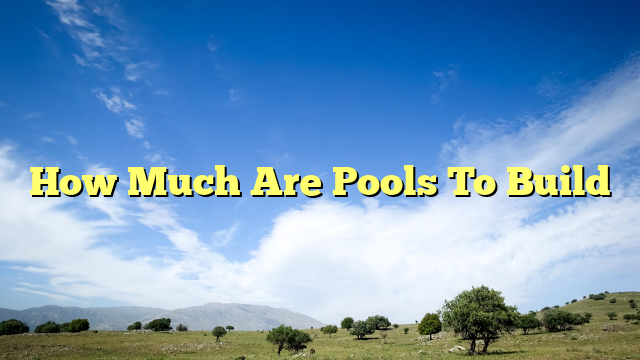Are you dreaming of a backyard oasis where you can relax, unwind, and create lasting memories with family and friends? One of the most luxurious additions you can make to your property is a swimming pool. But before you dive into the excitement of building your own private pool, it’s important to understand the financial investment required. In this article, we will explore the costs associated with building a pool, providing you with valuable insights that will help you plan and budget effectively for your dream aquatic retreat.
When it comes to building a pool, the cost can vary significantly based on various factors. The size and shape of the pool, the materials used, the additional features and amenities, and the complexity of the installation process all play a role in determining the final price tag. Whether you envision a sleek and modern infinity pool or a traditional and family-friendly design, it’s crucial to have a clear understanding of the expenses involved. By delving into the details, we will equip you with the knowledge you need to make informed decisions and turn your pool dreams into a tangible reality. So, let’s dive in and explore the exciting world of pool construction costs!
The cost of building a pool can vary greatly depending on factors such as size, materials, and additional features. On average, an inground pool can cost anywhere from $35,000 to $60,000 or more. Above-ground pools are generally more affordable, ranging from $1,500 to $15,000. It’s important to get detailed quotes from reputable pool builders to get an accurate estimate for your specific needs.
How Much Are Pools to Build?
Building a swimming pool in your backyard can be a great investment. Not only does it provide a luxurious and enjoyable way to spend your time, but it can also increase the value of your property. However, before you dive into the project, it’s important to understand the costs involved. In this article, we will break down the various factors that contribute to the overall cost of building a pool, helping you make an informed decision for your budget and needs.
1. Size and Design
The size and design of the pool are significant factors that influence the construction cost. Larger pools require more materials and labor, which can increase the overall expenses. Similarly, more intricate designs, such as custom shapes or additional water features, will add to the complexity and cost of the project. It’s important to carefully consider the size and design that aligns with your preferences and budget.
Additionally, the type of material used for the pool can also impact the cost. Concrete pools tend to be more expensive due to the extensive labor and customization involved. Fiberglass pools, on the other hand, may have a higher upfront cost but require less maintenance in the long run. Research and consult with professionals to determine the best material option for your desired pool size and design.
2. Site Preparation and Access
Another significant cost factor is the site preparation and access requirements. If your backyard has challenging terrain or limited access for construction equipment, additional measures may be necessary to prepare the area for a pool. This can include leveling the ground, removing trees or rocks, and building retaining walls. The more work needed to prepare the site, the higher the cost will be.
In some cases, the location of your property may also affect the cost. If your area has strict building codes or requires permits, you may need to allocate a portion of your budget to meet these requirements. Additionally, factors such as soil conditions, drainage, and proximity to utilities can impact the overall construction cost. It’s crucial to assess these factors beforehand to avoid any unexpected expenses.
3. Additional Features and Accessories
When budgeting for your pool, don’t forget to consider any additional features or accessories you may want. This can include items such as pool heating systems, lighting, waterfalls, or diving boards. While these features can enhance your pool experience, they can also add to the total cost. It’s essential to prioritize which features are most important to you and allocate your budget accordingly.
Furthermore, ongoing maintenance costs should also be taken into account when calculating the overall expenses. Regular cleaning, water treatment, and repairs are necessary to keep your pool in optimal condition. Understanding these ongoing costs will help you plan your budget for the long term.
4. Contractor and Labor Costs
The cost of hiring a professional contractor and labor is another significant aspect to consider. The expertise and experience of the contractor can impact the quality and efficiency of the pool construction. It is advisable to research and obtain quotes from multiple contractors to ensure you are getting a fair price for the project. Be sure to factor in any additional costs such as permits, insurance, and warranties when making your decision.
In conclusion, the cost of building a pool can vary greatly depending on various factors such as size, design, site preparation, additional features, and labor costs. It is essential to thoroughly research and plan your budget to ensure a successful and enjoyable pool construction experience. By considering these aspects, you will be able to make an informed decision and create the pool of your dreams within your desired budget.
Frequently Asked Questions
Here are some common questions and answers about the cost of building pools:
How much does it cost to build a pool?
Building a pool can vary greatly in cost depending on various factors such as the size, materials used, additional features, and location. On average, the cost can range from $30,000 to $70,000. However, for more luxurious or custom-designed pools, the cost can easily exceed $100,000.
It is important to keep in mind that these figures are just estimates and the final cost can be influenced by factors specific to your project, such as landscaping requirements, permits, and any necessary modifications to your property.
What factors impact the cost of building a pool?
Several factors can influence the cost of building a pool. These include the size and shape of the pool, the materials used for construction, the type of filtration and sanitation system, the addition of features like waterfalls or spas, and the complexity of the design. Additionally, factors such as the accessibility of the construction site and any necessary excavation or landscaping work can also impact the overall cost.
It is advisable to consult with a professional pool builder who can provide you with a detailed cost breakdown based on your specific requirements and preferences.
Are there ongoing costs associated with owning a pool?
Yes, owning a pool does come with ongoing costs. These costs include regular maintenance, water and electricity bills, and potential repairs or upgrades over time. Maintenance tasks such as cleaning, balancing chemicals, and maintaining the pool equipment are necessary to ensure the pool remains clean and safe to use.
It is also important to consider the cost of insurance, as pools can increase your liability coverage needs. Additionally, depending on the climate and usage, you may need to budget for heating costs to extend the swimming season.
Can I finance the construction of a pool?
Yes, many pool builders offer financing options for the construction of a pool. Financing allows you to spread the cost of building a pool over time, making it more manageable. However, it is important to carefully review the terms and conditions of any financing agreement, including interest rates, repayment periods, and any additional fees or charges.
Before committing to a financing option, it is recommended to compare different options and consult with a financial advisor to ensure it aligns with your budget and financial goals.
Are there any additional costs beyond the initial construction?
Yes, there can be additional costs beyond the initial construction of a pool. These costs can include regular maintenance and repairs, replacing pool equipment, ongoing water and electricity bills, and any necessary upgrades or renovations in the future.
It is important to factor in these ongoing costs when budgeting for a pool and to regularly assess and maintain the pool to prevent any major expenses down the line.
In conclusion, the cost of building a pool can vary greatly depending on various factors such as the size, design, materials used, and additional features. It is important to consider these factors and create a budget that reflects your needs and preferences. While the initial cost may seem daunting, it is essential to remember the long-term benefits and enjoyment that a pool can bring to your lifestyle.
Furthermore, it is crucial to consult with professionals in the field who can provide accurate estimates and guide you through the process. They can help you make informed decisions and ensure that your pool project stays within your budget. Remember, investing in a pool is not just about the monetary value, but also about the value it adds to your home, family, and overall well-being. So, take the time to research, plan, and budget accordingly, and soon you will be able to enjoy the wonderful benefits of having a pool in your own backyard.


















